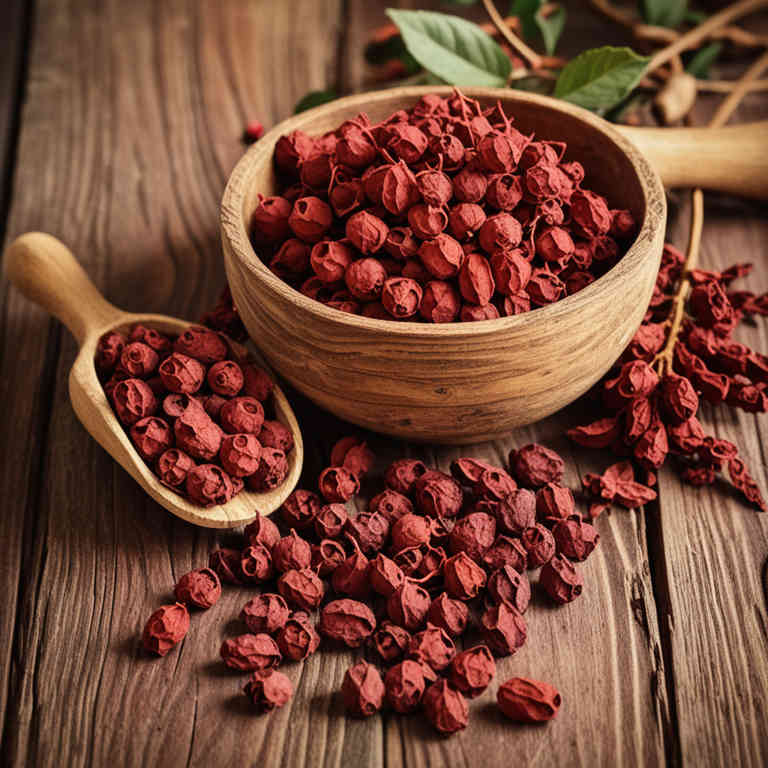Schisandra chinensis mucillage for medicinal use

Schisandra chinensis mucillage is a viscous, sticky substance derived from the fruit of the Schisandra chinensis plant, commonly known as the Chinese five-fruit.
This preparation is obtained by macerating the ripe berries in water or alcohol, allowing the mucilage to be extracted. In traditional Chinese medicine, it is valued for its purported ability to tonify the lungs, kidneys, and heart, and to enhance vitality. It is often used to support respiratory health, reduce fatigue, and improve mental clarity.
The mucilage is also believed to have mild laxative properties and is sometimes used in formulations for digestive support.
Uses
Schisandra chinensis mucillage has been used to support vitality and enhance mental clarity in traditional Chinese medicine for centuries.
Historically, it was valued for its ability to tonify the lungs, kidneys, and heart, and was often used to treat conditions such as fatigue, respiratory issues, and insomnia. In modern times, the mucilage from the fruit of Schisandra chinensis is recognized for its potential antioxidant and adaptogenic properties, which may help the body cope with stress. It is also being explored for its possible role in improving cognitive function and liver health.
Today, it is used in both traditional and complementary medicine practices worldwide.
Benefits
Schisandra chinensis mucillage has health benefits such as enhancing mental clarity, supporting liver function, and promoting respiratory health.
This herbal preparation is known for its adaptogenic properties, which help the body manage stress and improve overall resilience. It may also aid in boosting energy levels and improving sleep quality due to its rich content of bioactive compounds. The mucilage in Schisandra chinensis is believed to have soothing effects on the digestive system, potentially aiding in conditions like gastritis or irritable bowel syndrome.
Additionally, it has been traditionally used to support immune function and may contribute to detoxification processes in the body.
Constituents
Schisandra chinensis mucillage active constituents include lignans, alkaloids, and phenolic compounds.
These compounds are known to support liver function and enhance detoxification processes in the body. The lignans, such as schisandrin and dehydroshisandrin, are particularly noted for their antioxidant and hepatoprotective properties. Additionally, the mucilage content provides a soothing effect on the digestive tract, aiding in the relief of gastrointestinal discomfort.
This preparation is commonly used in traditional medicine to promote overall vitality and support the body's natural detoxification mechanisms.
Preparation
To make Schisandra chinensis mucillage, start by gathering fresh or dried Schisandra chinensis berries.
Wash the berries thoroughly and then grind them into a fine powder using a mortar and pestle or a blender. Next, place the powdered berries in a pot and add enough water to cover them by about an inch. Bring the mixture to a gentle simmer over low heat, allowing the mucilage to dissolve and thicken.
Finally, strain the mixture through a cheesecloth or fine mesh strainer to collect the mucilage, which can then be stored in a cool, dark place for future use.
Side Effects
Schisandra chinensis mucillage may lead to gastrointestinal discomfort, including nausea, vomiting, and diarrhea, particularly at high doses.
It can also cause liver toxicity in some individuals, especially when taken in excessive amounts or for prolonged periods. The preparation may interact with certain medications, such as those affecting the liver or central nervous system, increasing the risk of adverse effects. Additionally, some people may experience allergic reactions, including skin rashes or respiratory issues.
It is important to consult a healthcare professional before using this preparation, especially for individuals with pre-existing medical conditions.